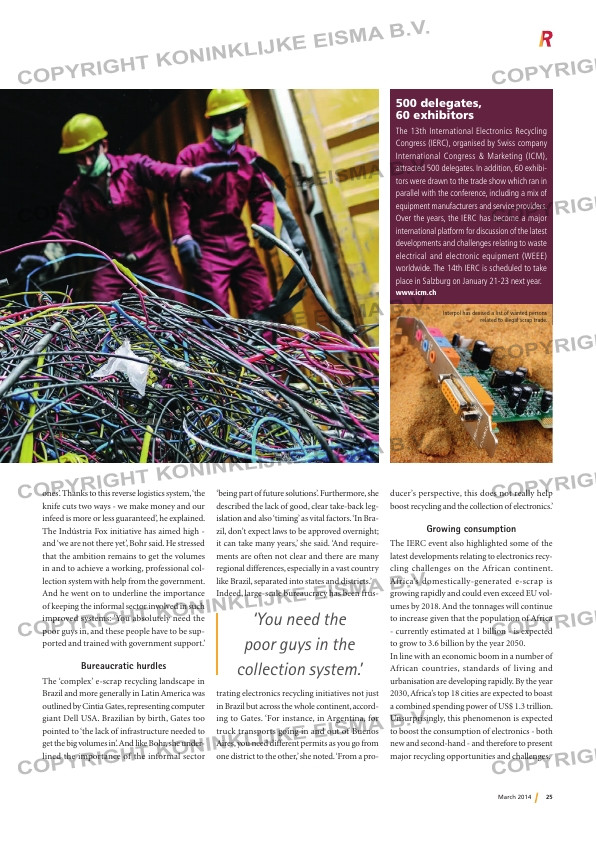Page 25 from: March 2014

25March 2014
ones’. Thanks to this reverse logistics system, ‘the
knife cuts two ways – we make money and our
infeed is more or less guaranteed’, he explained.
The Indústria Fox initiative has aimed high –
and ‘we are not there yet’, Bohr said. He stressed
that the ambition remains to get the volumes
in and to achieve a working, professional col-
lection system with help from the government.
And he went on to underline the importance
of keeping the informal sector involved in such
improved systems: ‘You absolutely need the
poor guys in, and these people have to be sup-
ported and trained with government support.’
Bureaucratic hurdles
The ‘complex’ e-scrap recycling landscape in
Brazil and more generally in Latin America was
outlined by Cintia Gates, representing computer
giant Dell USA. Brazilian by birth, Gates too
pointed to ‘the lack of infrastructure needed to
get the big volumes in’. And like Bohr, she under-
lined the importance of the informal sector
‘being part of future solutions’. Furthermore, she
described the lack of good, clear take-back leg-
islation and also ‘timing’ as vital factors. ‘In Bra-
zil, don’t expect laws to be approved overnight;
it can take many years,’ she said. ‘And require-
ments are often not clear and there are many
regional differences, especially in a vast country
like Brazil, separated into states and districts.’
Indeed, large-scale bureaucracy has been frus-
trating electronics recycling initiatives not just
in Brazil but across the whole continent, accord-
ing to Gates. ‘For instance, in Argentina, for
truck transports going in and out of Buenos
Aires, you need different permits as you go from
one district to the other,’ she noted. ‘From a pro-
ducer’s perspective, this does not really help
boost recycling and the collection of electronics.’
Growing consumption
The IERC event also highlighted some of the
latest developments relating to electronics recy-
cling challenges on the African continent.
Africa’s domestically-generated e-scrap is
growing rapidly and could even exceed EU vol-
umes by 2018. And the tonnages will continue
to increase given that the population of Africa
– currently estimated at 1 billion – is expected
to grow to 3.6 billion by the year 2050.
In line with an economic boom in a number of
African countries, standards of living and
urbanisation are developing rapidly. By the year
2030, Africa’s top 18 cities are expected to boast
a combined spending power of US$ 1.3 trillion.
Unsurprisingly, this phenomenon is expected
to boost the consumption of electronics – both
new and second-hand – and therefore to present
major recycling opportunities and challenges.
500 delegates,
60 exhibitors
The 13th International Electronics Recycling
Congress (IERC), organised by Swiss company
International Congress & Marketing (ICM),
attracted 500 delegates. In addition, 60 exhibi-
tors were drawn to the trade show which ran in
parallel with the conference, including a mix of
equipment manufacturers and service providers.
Over the years, the IERC has become a major
international platform for discussion of the latest
developments and challenges relating to waste
electrical and electronic equipment (WEEE)
worldwide. The 14th IERC is scheduled to take
place in Salzburg on January 21-23 next year.
www.icm.ch
‘You need the
poor guys in the
collection system.’
Interpol has devised a list of wanted persons
related to illegal scrap trade.
RI-2-2014-IERC.indd 25 06-03-14 09:17



